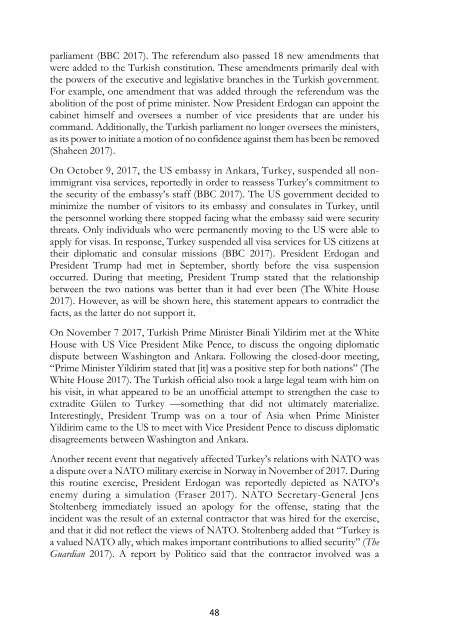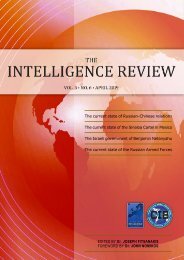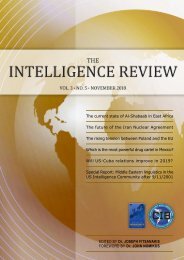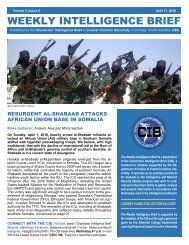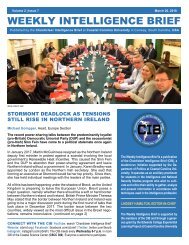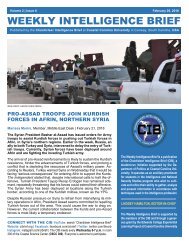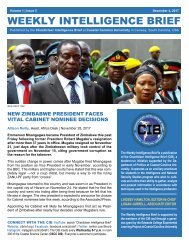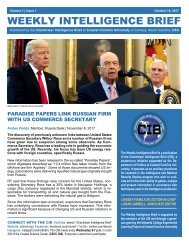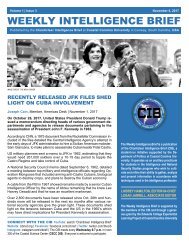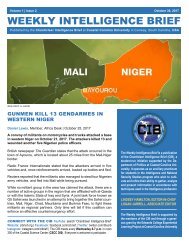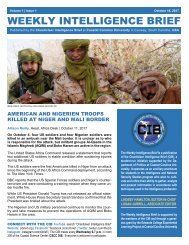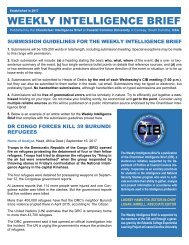The Intelligence Review | volume 2 | issue 4 |
This volume is the product of a collaboration between the European Intelligence Academy (EIA) and the Chanticleer Intelligence Brief (CIB), a student-run initiative supported by the Department of Politics at Coastal Carolina University in Conway, South Carolina, United States. Four CIB analysts tackle some of the most pressing and timely questions confronting intelligence observers today. Topics in this volume include the possibility of a war with North Korea, and the rise of far-right militancy in the United States. The volume also includes an assessment of the impact of the Islamic State in the relations between Russia and the United States, and a discussion of Turkish politics and its effect on NATO's cohesion.
This volume is the product of a collaboration between the European Intelligence Academy (EIA) and the Chanticleer Intelligence Brief (CIB), a student-run initiative supported by the Department of Politics at Coastal Carolina University in Conway, South Carolina, United States. Four CIB analysts tackle some of the most pressing and timely questions confronting intelligence observers today. Topics in this volume include the possibility of a war with North Korea, and the rise of far-right militancy in the United States. The volume also includes an assessment of the impact of the Islamic State in the relations between Russia and the United States, and a discussion of Turkish politics and its effect on NATO's cohesion.
You also want an ePaper? Increase the reach of your titles
YUMPU automatically turns print PDFs into web optimized ePapers that Google loves.
parliament (BBC 2017). <strong>The</strong> referendum also passed 18 new amendments that<br />
were added to the Turkish constitution. <strong>The</strong>se amendments primarily deal with<br />
the powers of the executive and legislative branches in the Turkish government.<br />
For example, one amendment that was added through the referendum was the<br />
abolition of the post of prime minister. Now President Erdogan can appoint the<br />
cabinet himself and oversees a number of vice presidents that are under his<br />
command. Additionally, the Turkish parliament no longer oversees the ministers,<br />
as its power to initiate a motion of no confidence against them has been be removed<br />
(Shaheen 2017).<br />
On October 9, 2017, the US embassy in Ankara, Turkey, suspended all nonimmigrant<br />
visa services, reportedly in order to reassess Turkey’s commitment to<br />
the security of the embassy’s staff (BBC 2017). <strong>The</strong> US government decided to<br />
minimize the number of visitors to its embassy and consulates in Turkey, until<br />
the personnel working there stopped facing what the embassy said were security<br />
threats. Only individuals who were permanently moving to the US were able to<br />
apply for visas. In response, Turkey suspended all visa services for US citizens at<br />
their diplomatic and consular missions (BBC 2017). President Erdogan and<br />
President Trump had met in September, shortly before the visa suspension<br />
occurred. During that meeting, President Trump stated that the relationship<br />
between the two nations was better than it had ever been (<strong>The</strong> White House<br />
2017). However, as will be shown here, this statement appears to contradict the<br />
facts, as the latter do not support it.<br />
On November 7 2017, Turkish Prime Minister Binali Yildirim met at the White<br />
House with US Vice President Mike Pence, to discuss the ongoing diplomatic<br />
dispute between Washington and Ankara. Following the closed-door meeting,<br />
“Prime Minister Yildirim stated that [it] was a positive step for both nations” (<strong>The</strong><br />
White House 2017). <strong>The</strong> Turkish official also took a large legal team with him on<br />
his visit, in what appeared to be an unofficial attempt to strengthen the case to<br />
extradite Gülen to Turkey —something that did not ultimately materialize.<br />
Interestingly, President Trump was on a tour of Asia when Prime Minister<br />
Yildirim came to the US to meet with Vice President Pence to discuss diplomatic<br />
disagreements between Washington and Ankara.<br />
Another recent event that negatively affected Turkey’s relations with NATO was<br />
a dispute over a NATO military exercise in Norway in November of 2017. During<br />
this routine exercise, President Erdogan was reportedly depicted as NATO’s<br />
enemy during a simulation (Fraser 2017). NATO Secretary-General Jens<br />
Stoltenberg immediately <strong>issue</strong>d an apology for the offense, stating that the<br />
incident was the result of an external contractor that was hired for the exercise,<br />
and that it did not reflect the views of NATO. Stoltenberg added that “Turkey is<br />
a valued NATO ally, which makes important contributions to allied security” (<strong>The</strong><br />
Guardian 2017). A report by Politico said that the contractor involved was a<br />
48


